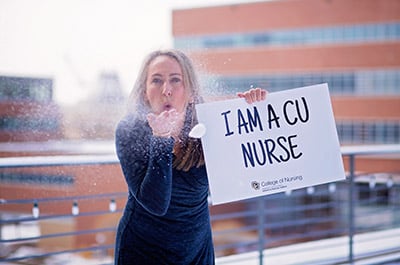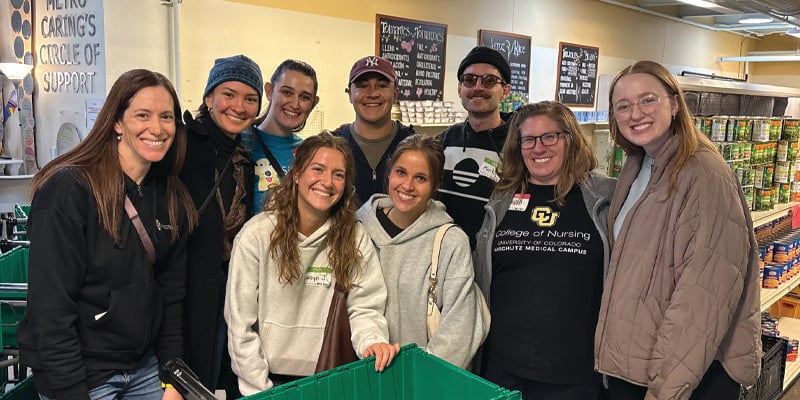Sheila Tann, ND, APRN, CNS, CPNP-CP, found nursing after investigating the characteristics of various healthcare professions. The appeal for her was how nurses work with individuals, families, and communities. Nurses are trained to engage their patients differently from other providers, and for Dr. Tann, that sets them apart. She attests, “Nursing is the perfect combination of science and compassion.”

Sheila Tann having fun in Colorado snow. |
At the University of Colorado College of Nursing, Tann was able to dive into the world of nursing, focusing on science and compassion. The Doctor of Nursing (ND) program predates the Doctor of Nursing Practice (DNP) and was one of the first clinical doctorates that CU offered for nursing. Tann was able to study under one of the greatest theorists in the history of nursing. Jean Watson, PHD, RN, AHN-BC, FAAN, LL (AAN), had previously served as dean of CU Nursing and her philosophy of care, driven by her Theory of Human Caring, permeated every program at the school. Tann remembers an underlying notion that the students were encouraged to become any type of nurse they wanted to be. “In addition to traditional nursing science, we had art and music classes centered on caring for others. The projects we were assigned reflected nursing through those mediums. The ND program was Jean Watson’s brainchild, and at the time, she was in her prime as a nurse theorist. We were so lucky to be trained by her,” says Tann.
Throughout her expansive career, Tann has taught, researched, and worked clinically. Today, she is running her own telehealth practice while continuing to work as a primary care provider in pediatrics.
Tann’s practice, My Place Pediatrics, is specifically for children and young adults with Attention Deficit Hyperactive Disorder (ADHD), anxiety, depression, and other neurodevelopmental and mental health concerns. She identified this group as lacking the support necessary from the current health care system. The original concept for the practice was to care for children and families that often have a hard time working through mental health needs. Tann asserts there is not enough time or providers for those complex issues in episodic visits. Therefore, due to the changing healthcare landscape at the start of the COVID-19 pandemic, she expanded the idea to telehealth instead of a traditional clinical environment.
With telemedicine and telehealth finally being embraced by patients, families, and the medical community, Tann delivers service to clients throughout Colorado. She finds that children and young adults are more relaxed because there is no waiting room and appointments are unrushed. Parents can attend while at work, and students can jump on the video call during school. Entire families receive individualized attention, which Tann says makes telehealth the ideal method to treat these patients. Tann’s tele-adaptations have created a convenient, calm environment that is genuine and easy for herself and the clients.
To current students, Tann insists on rejecting limitations. The opportunities in nursing go far beyond clinical roles. If young nurses have passions, or ideas that seem non-traditional, she encourages them to explore options. “Don’t forget that you can be an entrepreneur. Envision the life you want in nursing. Stay creative! Find resources and mentors to build your reality.”



